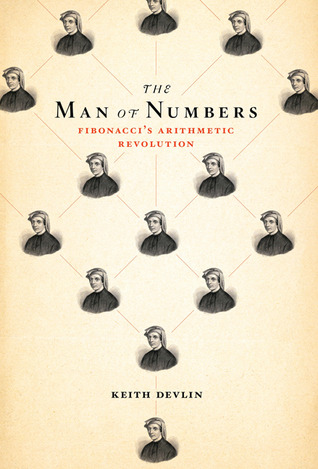The Man of Numbers: Fibonacci's Arithmetic Revolution
by Keith J. Devlin
Summary: In 1202, a 32-year old Italian finished one of the most influential books of all time, which introduced modern arithmetic to Western Europe. Devised in India in the 7th and 8th centuries and brought to North Africa by Muslim traders, the Hindu-Arabic system helped transform the West into the dominant force in science, technology, and commerce, leaving behind Muslim cultures which had long known it but had failed to see its potential.The young Italian, Leonardo of Pisa (better known today as Fibonacci), had learned the Hindu number system when he traveled to North Africa with his father, a customs agent. The book he created wasLiber abbaci, the "Book of Calculation," and the revolution that followed its publication was enormous. Arithmetic made it possible for ordinary people to buy and sell goods, convert currencies, and keep accurate records of possessions more readily than ever before. Liber abbaci's publication led directly to large-scale international commerce and the scientific revolution of the Renaissance.Yet despite the ubiquity of his discoveries, Leonardo of Pisa remains an enigma. His name is best known today in association with an exercise in Liber abbaci whose solution gives rise to a sequence of numbers--the Fibonacci sequence--used by some to predict the rise and fall of financial markets, and evident in myriad biological structures.One of the great math popularizers of our time, Keith Devlin recreates the life and enduring legacy of an overlooked genius, and in the process makes clear how central numbers and mathematics are to our daily lives.
Review: A short tale of Fibonacci with a good dose of the Hindu-Arabic number system.
It really is incredible to think how different our lives would be without the Hindu-Arabic number system. I certainly can’t imagine having to do problems with Roman numerals. Fibonacci, or technically, Leonardo of Pisa, was one of the people who helped to popularize the Hindu-Arabic number system by bringing it to the attention of a large number of people. It took an incredible amount of research for scholars to realize how important Leonardo’s works are. I myself was giddy at the old and incredibly rare books that were mentioned.
Leonardo’s skill in math is certainly hard to deny. What is most incredible are the problems that Leonardo describes and solves in Liber abbaci. Some problems take paragraphs or even pages to solve. Today, those problems take only a few steps to solve using symbols. I can’t imagine how much went into solving such seemingly simple problems. Very little is actually known about Leonardo although the author does a good job of showing the world that Leonardo lived in. The history of abacus books is also mentioned. I found it to be a fascinating subset of rare books.
Rating:
Recommendation: I would recommend this book to those interested in the history of mathematics.


No comments:
Post a Comment